Trump said Clinton’s supporters are mostly Hollywood celebrities on the decline.
- Bernie Sanders seeks to continue his movement
- Donald Trump: Hillary Clinton’s backers are “celebrities that aren’t very hot anymore”
- What happens when campaign surrogates go astray?
- Clinton is in uncharted territory when it comes to fundraising
Trump retreats further from a hard line on illegal immigration
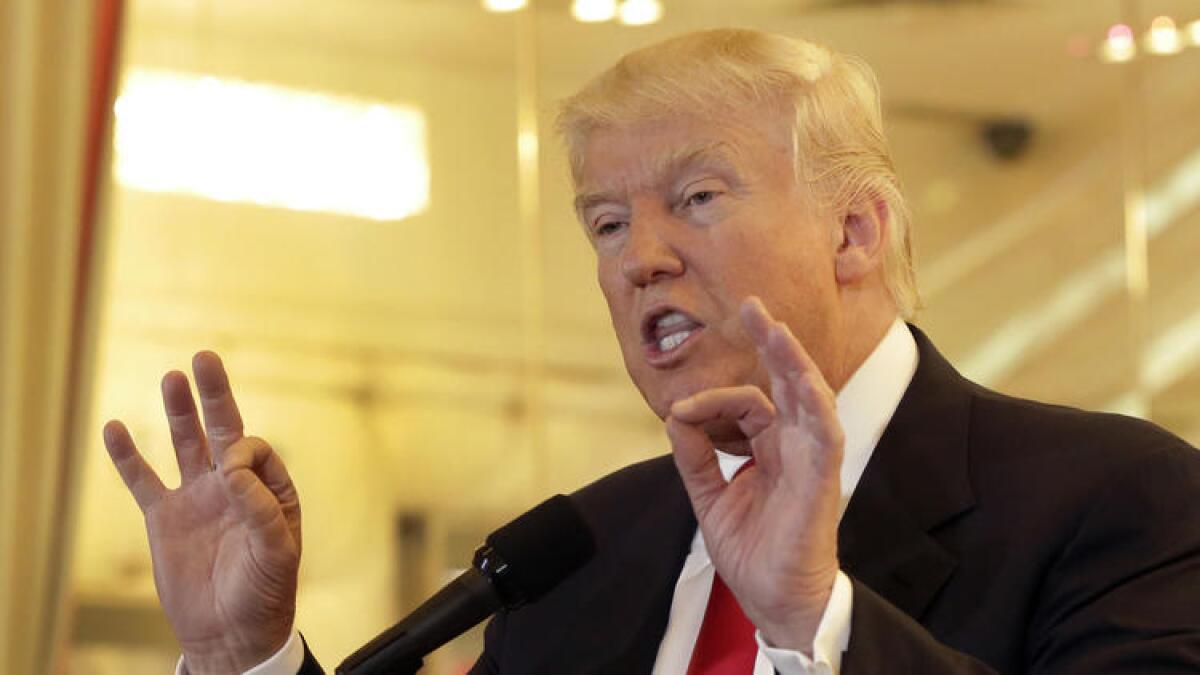
Donald Trump retreated further from his hard line on illegal immigration, suggesting he might allow some of those in the U.S. illegally to remain if they paid back taxes.
Asked on Fox News whether he would show flexibility on the potential deportation of long-standing immigrants with no criminal record, the Republican presidential nominee said that he would.
“No citizenship,” he said. “Let me go a step further: They’ll pay back taxes. They have to pay taxes. There’s no amnesty, as such. There’s no amnesty, but we work with them.”
Trump’s remarks, televised Wednesday night, came at a Fox News forum Tuesday in Austin, Texas.
In another segment televised Tuesday, Trump backed away from his vow to deport 11 million immigrants in the country illegally. He said he was open to softening immigration laws to “accommodate those people that contribute to society, have been law-abiding, have kids here.”
Trump’s shift from the tougher stands he took during his battle for the GOP nomination come as he is struggling to widen his appeal for the general election. Trump has said he would lay out a detailed immigration agenda in the next two weeks.
In the meantime, he has stuck by his vow to build a wall on the U.S. border with Mexico and campaigned with the mothers of people killed by immigrants in the country illegally.
Hillary Clinton says Trump ‘taking a hate movement mainstream’
Taking respite between fundraisers in California on Wednesday, Hillary Clinton urged voters to not be swayed by Donald Trump’s recent attempts to appeal to minorities.
“When someone shows you who they are, believe them the first time,” Clinton said in a CNN interview, reciting a phrase from the poet Maya Angelou. “He is taking a hate movement mainstream.”
For nearly a year, Trump’s campaign has been been marked by divisive and racially coded rhetoric. In recent days, however, he has softened his message and insisted that he’s best fit to improve schools, create jobs and foster safer communities for blacks and Latinos.
He has said that Democrats, a party that often wins in areas that are predominately black and Latino, are to blame for a wide range of problems faced by minorities. At a rally Wednesday in Mississippi, Trump called Clinton a “bigot,” saying she takes the votes of minorities for granted.
In response, Clinton cited a housing discrimination lawsuit the Department of Justice filed against Trump in the 1970s and his calls for mass deportations of immigrants in the country illegally.
Trump, she said on CNN, is “someone who is very much peddling bigotry and prejudice and paranoia.”
Clinton is set to deliver a speech in Reno on Thursday in which she raises questions about alleged connections between Trump’s presidential campaign and conservative extremist groups.
“This ‘alt-right’ brand is embracing extremism and presenting a divisive and dystopian view of America which should concern all Americans, regardless of party,” the Clinton campaign said in a statement this week. “In her remarks, Clinton will contrast Donald Trump’s divisive views and dangerous temperament with her vision of an America that is stronger together and where everyone has a role to play in the future.”
Bernie Sanders launches political organization to further his progressive ideals
His campaign is over, yet Bernie Sanders says that the movement he helped create — one that ignited a youthful, liberal following during the Democratic primary — will press onward.
And on Wednesday, the Vermont senator sought to help it press ahead with the launch of Our Revolution, a political organization that will raise money and dole it out to candidates in lockstep with Sanders’ ideals.
“We changed the conversation regarding the possibilities of our country,” Sanders said of his campaign against Hillary Clinton, the Democratic nominee. “We redefined what the vision and the future of our country should be.”
Yet the group’s launch has been a bit bumpy.
Several key staffers initially involved in the group resigned in recent days after Sanders announced that Jeff Weaver, a long-time aide to Sanders who served as his campaign manager, would oversee it.
Weaver, whose style can at times be combative, had set up the group as a 501(c)(4), which allows it to receive unlimited contributions from anonymous donors — a move, said a person close to the group who is not authorized to speak publicly, that led to the resignations because it contrasts with ideals Sanders preached on the campaign trail.
Throughout the primary Sanders railed against big money in politics. That message, coupled with pledges to address income inequality, fueled his grass-roots following.
In a speech livestreamed Wednesday night from Burlington, Vt., Sanders did not note the group’s status as a 501(c)(4), but stressed that his populist message would endure.
He noted that his campaign helped push forward a progressive platform at the Democratic National Convention last month. The platform calls for a $15-per-hour federal minimum wage, expansion of Social Security and setting a price on greenhouse gas emissions.
“If anyone thinks that that document and what is in that platform is simply going to be resting on a shelf somewhere accumulating dust, they are very mistaken,” Sanders said. “We are going to bring that platform alive and make it the blueprint for moving the Democrats forward.”
Sanders, who formally endorsed Clinton last month, plans to stump for her in several battleground states this fall.
He has also endorsed the campaigns of down-ticket candidates in a host of states, who have embraced his calls for free college tuition and raising the federal minimum wage, now at $7.25.
Among those candidates is Tim Canova, who is challenging Debbie Wasserman Schultz, former chairwoman of the Democratic National Committee, in an Aug. 30 primary for the South Florida congressional seat she’s held since 2013.
Sanders battled with Wasserman Schultz throughout the primary, saying she was tipping the scales for Clinton by, among other things, offering a limited number of debates. Wasserman Schultz resigned last month after internal emails made public by the website WikiLeaks confirmed bias by some DNC officials in favor of Clinton.
Trump, who predicts he will be called ‘Mr. Brexit,’ campaigns with the man who led Brexit
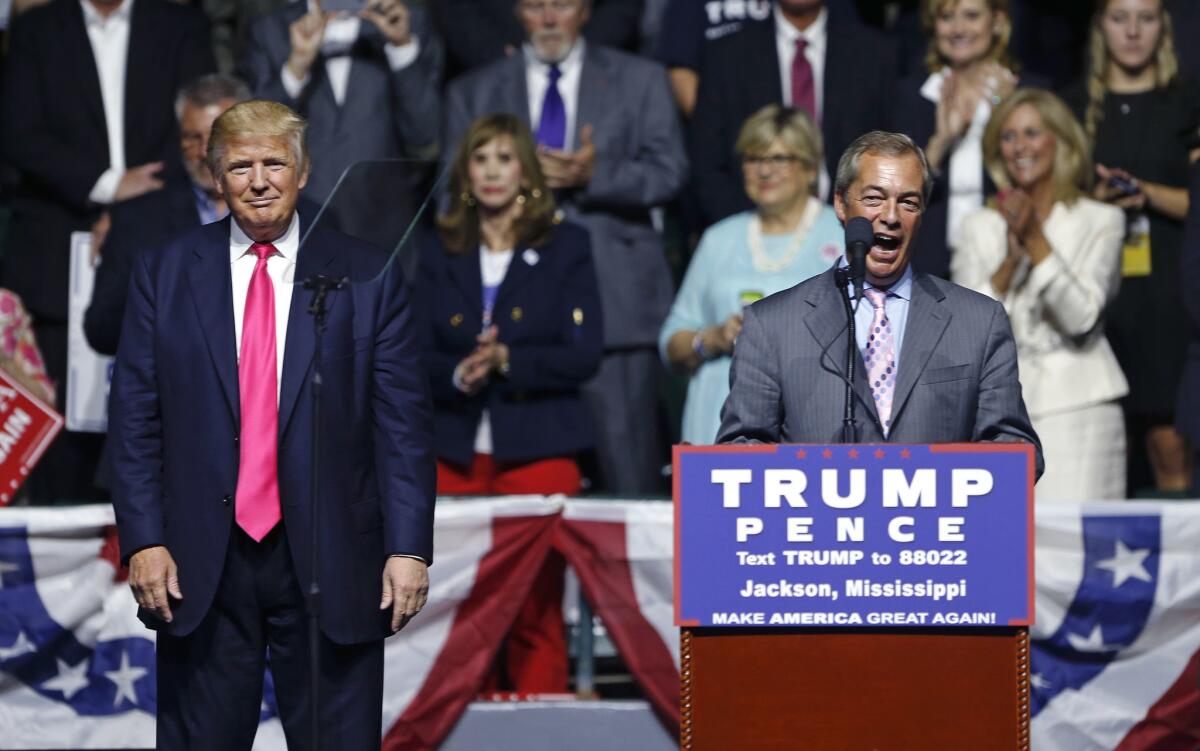
Donald Trump and the man who spearheaded the drive to have Britain leave the European Union contended Wednesday night that a similar political upheaval was possible in the November election in the United States.
Nigel Farage, the former leader of Britain’s Independence Party and chief promoter of Brexit, said voters there proved pundits and pollsters wrong because they were tired of being governed by disconnected leaders who cared more for global corporations than the citizenry’s needs.
“We reached those people who have never voted in their lives, but believed … they could take back control of their country, take back control of their borders and get back their pride and self-respect,” Farage said, adding that the parallels between conditions in Britain and the U.S. were clear. “You can beat the pollsters, you can beat the commentators, you can beat Washington.”
Campaigning in front of thousands of Trump supporters in Jackson, Miss., Farage said it would be inappropriate for him, as a foreign leader, to tell them who to vote for. But if he were an American citizen, he added, he would never vote for Democratic nominee Hillary Clinton.
Trump last week declared on Twitter that he would be known as “Mr. Brexit.” Trump didn’t clarify what he meant, but one likely explanation was that he was referring to his own struggle in the polls. The Republican nominee significantly trails Clinton nationally and in most swing-state polls.
Trump has a steep hill to climb to match the surprise results of the Brexit referendum. Polls were tight ahead of the vote and showed a slight edge for a vote for Britain to stay in the EU.
Still, Trump pointed to the June referendum to predict that a similar movement was happening in the United States.
“They voted to break away from rule by large corporations and media executives who believe in a world without borders. They voted to reclaim control over immigration, over their economy, over the government,” Trump said. “Working people and the great people of the United Kingdom took control of their destiny…. The same thing is happening right here in the United States. It’s happening.”
Clinton rakes in at least $12.5 million, with one more day of California fundraising to go
Hillary Clinton has already netted a minimum of $12.5 million as she starts her third day of a California money run.
The haul from six events in Los Angeles, Laguna Beach and the Bay Area on Monday and Tuesday is certainly higher than that because the figure was calculated based on minimum ticket prices for the dinners, luncheons and cocktail parties Clinton is headlining around the state.
The money will be split between the Democratic nominee’s campaign and several party organizations. Wednesday is the final day of Clinton’s visit to the state that is living up to its clichéd nickname as the ATM of national politics.
Clinton arrived at the first fundraiser of the day, at the Sofitel San Francisco Bay in Redwood City, shortly after 1 p.m. Then she will head to a reception in Los Altos Hills that will feature Apple CEO Tim Cook and a dinner in Woodside.
The tally will certainly go up by day’s end.
When candidates’ surrogates go astray
A presidential candidate’s surrogates — often popular politicians and celebrities — are supposed to credibly articulate the candidate’s policies and defend their character against smears.
But when surrogates go off message, it presents a particularly vexing problem for a campaign.
This week, Democratic nominee Hillary Clinton and GOP nominee Donald Trump saw their surrogates undercut their presidential bids.
As Trump and his supporters have questioned Clinton’s health, Dr. Ben Carson said on Wednesday that both candidates should release their full medical histories.
The previous day, longtime Trump advisor Roger Stone argued that Trump should release his tax returns, a move the GOP nominee is resisting and for which Democrats are hammering him.
On the Democratic side, as Clinton struggled with new disclosures about her family’s charitable foundation during her time as secretary of State, former Pennsylvania Gov. Ed Rendell said that a firewall between the foundation and the State Department appeared “ineffective” and the new disclosures created a “bad perception.”
Political advisors say such statements show the danger of having someone else, typically a large personality in his or her own right, try to sublimate their own views and carry a politician’s message.
“Surrogates at their best act as force multipliers — allowing your candidate’s message to get out far and wide. But they’re also human beings, many of them prominent in their own right, who sometimes actually tell the truth. Campaigns hate that,” said Reed Galen, a GOP operative who worked for former President George W. Bush.
Hillary Clinton is exploring the outer limits of fundraising like no presidential nominee ever has
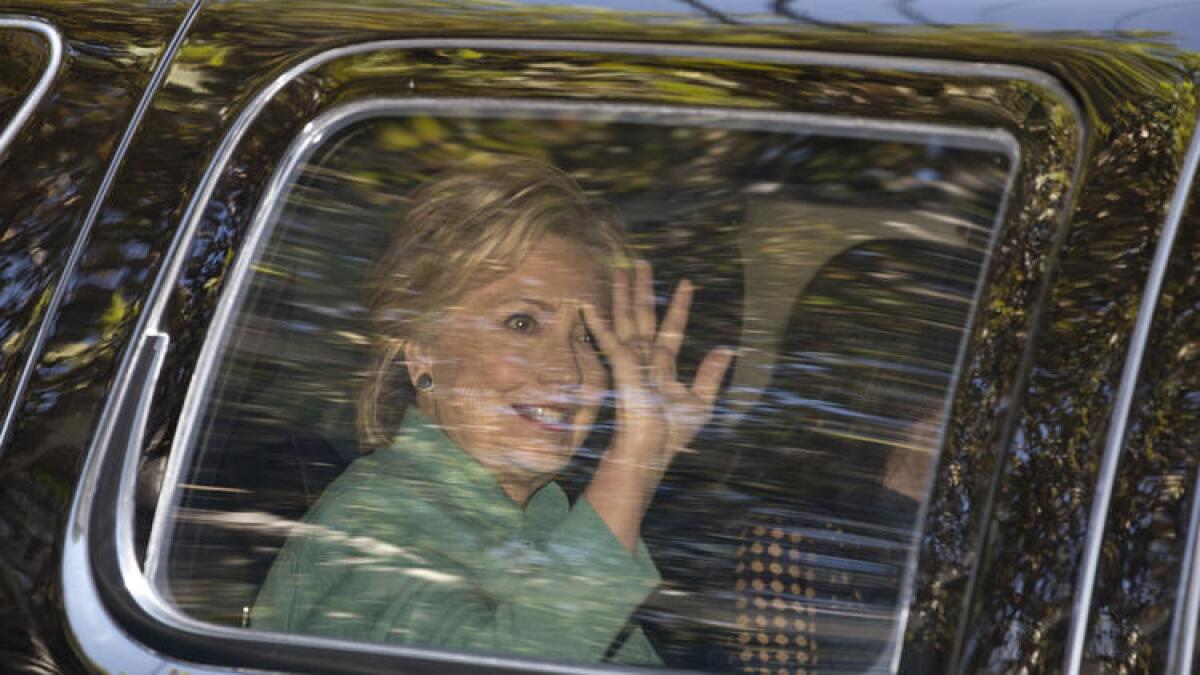
If there were a moment in this presidential race when Hillary Clinton could act on her stated outrage over the obscene amount of money in politics, it is probably now, having eclipsed her rival Donald Trump in terms of cash in the bank and blocked off his most direct paths to victory.
But Clinton isn’t tapping the brakes. She is instead on an extended tour through the nation’s elite enclaves — from Laguna Beach to the Hamptons, Martha’s Vineyard to Magic Johnson’s house in Los Angeles – in an unrestrained fundraising blitz that makes even some supporters chafe.
The price of entry at several of the stops, such as Monday’s dinner at the Beverly Hills home of entertainment mogul Haim Saban, is $50,000 per person. On the Vineyard on Saturday, Clinton netted roughly $2 million at a single cocktail party, then darted off to a small dinner event at a billionaire’s home that generated an additional $1 million.
By midweek, the Clinton war chest had grown by many millions more, as the Democratic presidential candidate hopscotched on a three-day California swing from Johnson’s house to the Saban affair and then to the home of Justin Timberlake and Jessica Biel, where Jennifer Aniston, Jamie Foxx and Tobey Maguire also showed up. Then it was off to the Bay Area for multiple events, including one hosted by Apple Chief Executive Tim Cook.
Donald Trump’s shifting talk on immigration shows his struggle to reach beyond his core supporters
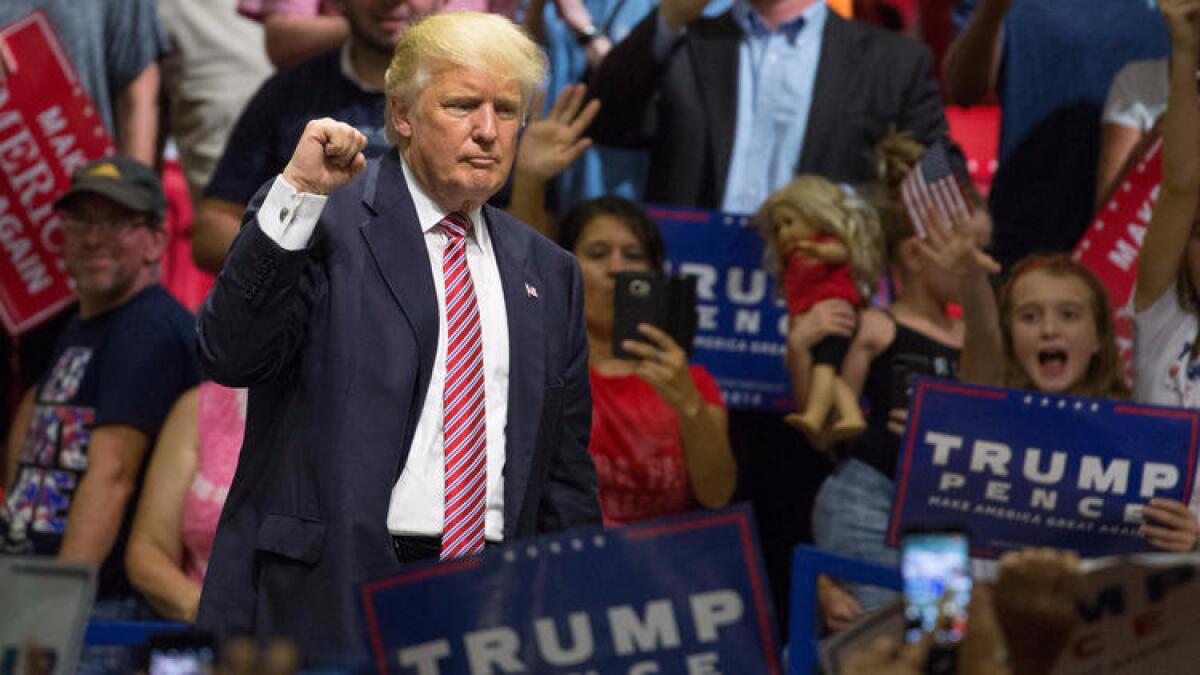
Donald Trump’s latest contortions over immigration policy underscore one of his most daunting challenges: speaking to multiple audiences at once.
Presidential candidates often struggle to smooth sharp rhetoric as they move to moderate their image in a general election — Mitt Romney’s strategist famously likened the process to shaking a child’s Etch A Sketch.
But Trump, who won in a crowded primary by obliterating nearly every rhetorical boundary, seems to find the task exceedingly difficult.
His support among Latinos, blacks and other minority voters ranks well behind rival Hillary Clinton, and in some cases, among the lowest ever recorded in polls. Perhaps more important to Trump’s electoral strategy, accusations of racist rhetoric have stymied his ability to consolidate moderate Republicans and independents, especially suburban women.
Donald Trump delivers his biggest insult yet, demeaning celebrities for their not-hotness
Donald Trump had some advice for Justin Timberlake, Jennifer Aniston, Cher, Jamie Foxx, Kim Kardashian, Kanye West, George Clooney, et al.: Get over yourself.
Trump, speaking at a rally in Tampa, Fla., on Wednesday, left his scripted speech about trade, scandals, email and job-killing regulations to lodge an ice-cold dis on the cache of famous people supporting his rival, Hillary Clinton.
“The only enthusiastic supporters of her campaign are Hollywood celebrities, in many cases celebrities that aren’t very hot anymore,” Trump said.
Ouch.
Predictably, that elicited some snarky retorts on social media, most of them involving Scott Baio, the closest thing to A-list at the Republican National Convention last month.
Justin Timberlake, Jessica Biel, Jennifer Aniston and more do lunch with Hillary Clinton

Who needs Leonardo DiCaprio to host a $3.34-million fundraiser when Jessica Biel and Justin Timberlake are waiting in the wings and more than willing to take the reins?
Hillary Clinton mixed with A-list donors in the Hollywood Hills on Tuesday at Casa de Timberbiel, where a big-money lunch for 100 people was moved after DiCaprio backed out of hosting duties suddenly over the weekend.
“Look who came over for lunch... #imwithher,” Biel said on Instagram, captioning a strip of black-and-white photo-booth photos that featured her mugging with Timberlake and the Democrats’ nominee for president.
Clinton campaign manager defends her lack of news conferences
Hillary Clinton’s campaign defended her lack of news conferences Wednesday, arguing that she offers hundreds of interviews to reporters.
“She is out there answering questions,” Robby Mook said on MSNBC. “She takes questions in a variety of formats.”
In response, Nicolle Wallace, who served as communications chief for former President George W. Bush, blasted Mook, calling the strategy a failure to address voter concerns about Clinton’s trustworthiness.
“Isn’t the antidote to this to sit her down today ... and let her take questions until there are no more questions to be answered?” asked Wallace, an MSNBC guest commentator.
Mook said Clinton has conducted more than 300 interviews.
Hillary Clinton ‘knows she’s guilty,’ Donald Trump says
Americans know Hillary Clinton is “guilty” and even she “knows she’s guilty,” Donald Trump said of new revelations about Clinton Foundation donors’ access to her while she was secretary of State.
“She’s lied all over the place,” Trump told Fox News in a taped interview that aired Wednesday. “And it’s almost like she can do whatever she wants to do.”
Trump was reacting to newly released emails from the private account that Clinton used while secretary of State that revealed the blurred lines between Clinton’s State Department and her family’s charitable organization.
Additionally, the FBI has said it found about 14,000 Clinton documents, including emails, in its investigation into whether sensitive information was mishandled because of the private server. It has turned those documents over to the State Department, which plans to release some before the election, pending reviews.
Trump has called for a special prosecutor to investigate his Democratic rival and said the newest email revelations show she is “100% guilty” of skirting the law.
“They get a lot of things for this,” Trump said of the foundation donors. “Those meetings didn’t take place to say hello.”
Clinton has long acknowledged that using a private email account was a mistake but that she broke no laws. After its investigation, the FBI declined to recommend that charges be pursued; Director James Comey said that “no reasonable prosecutor” would bring such a case.
As John McCain fights for reelection, the Trump problem cuts two ways — both against him
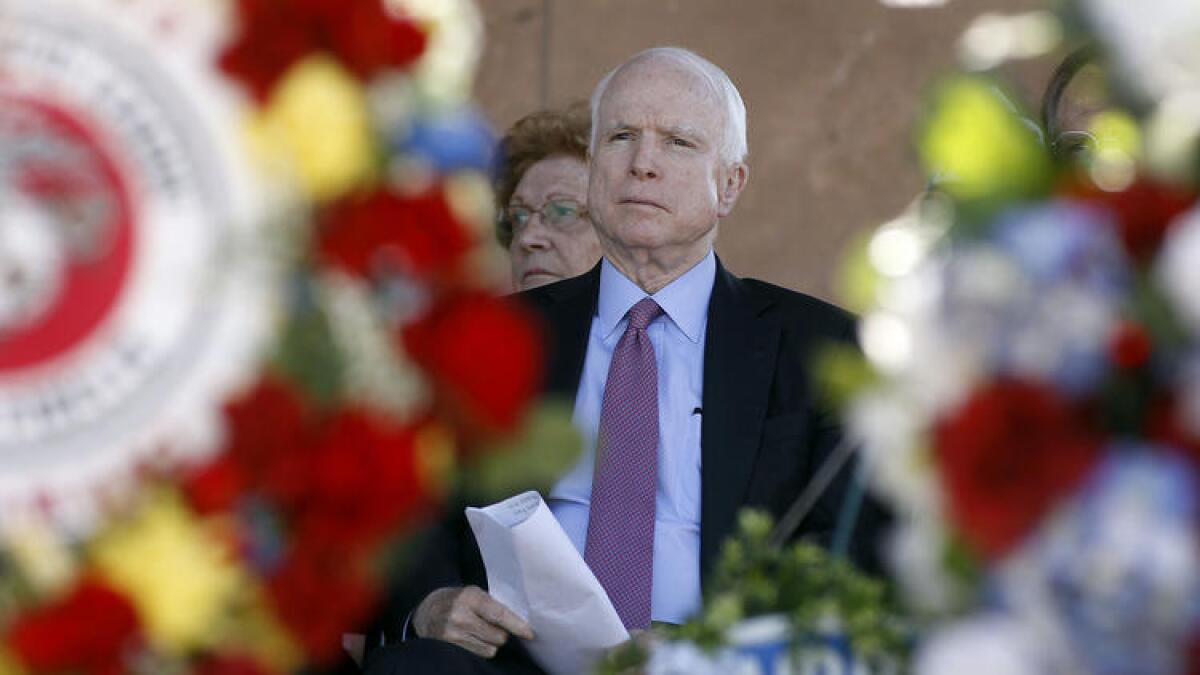
John McCain came to talk about honor and duty. The setting was an American Legion post, where Arizona’s senior senator unfurled an army’s worth of endorsements from military brass supporting his November reelection bid.
A group of veterans sat at a small cluster of tables pushed together in the nearly empty room before cameras trained on the made-for-TV event.
But all reporters cared about was Donald Trump. What did McCain think of his latest campaign shake-up? “Do you have a question about veterans?” McCain demanded.
What did he think about veterans denouncing Trump? About Trump insulting the family of a soldier killed in Iraq? About the military brass who called Trump unfit to serve as commander in chief?
His face reddening, his anger rising with the color in his cheeks, McCain responded through gritted teeth. “I’m running my campaign for the United States Senate,” he said. Anything to do with Trump and who is or isn’t supporting the Republican presidential nominee, he insisted, had nothing to do with his race.
Ralph Nader shook up the election in 2000. Will a third-party candidate do the same in 2016?
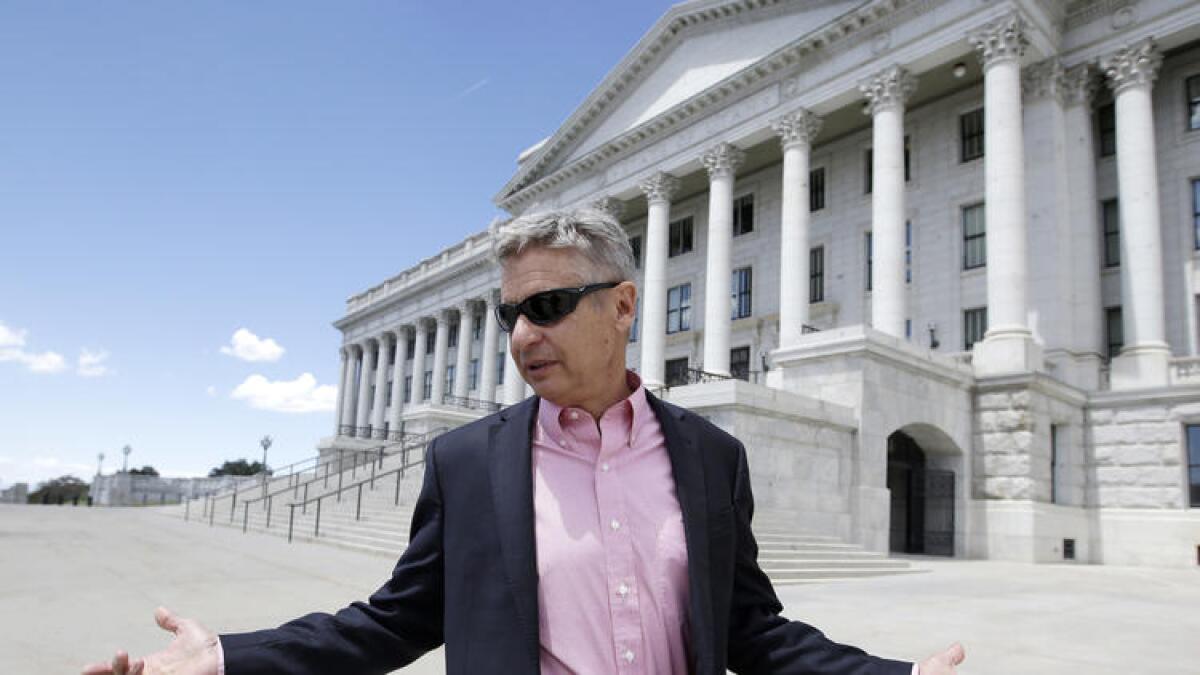
A growing contingent of dissatisfied voters could pledge their support to presidential candidates other than a Republican or Democrat come November.
Green Party nominee Jill Stein and Libertarian nominee Gary Johnson are the top third-party candidates drawing attention from conservatives and liberals who have rejected Hillary Clinton and Donald Trump. Both outsiders ran for president in 2012, but neither amassed enough votes to change the outcome of the race between Mitt Romney and President Obama.
This time around, could the results be different? According to Pew Research Center, overall satisfaction with the majority-party candidates has hit its lowest point in 20 years.